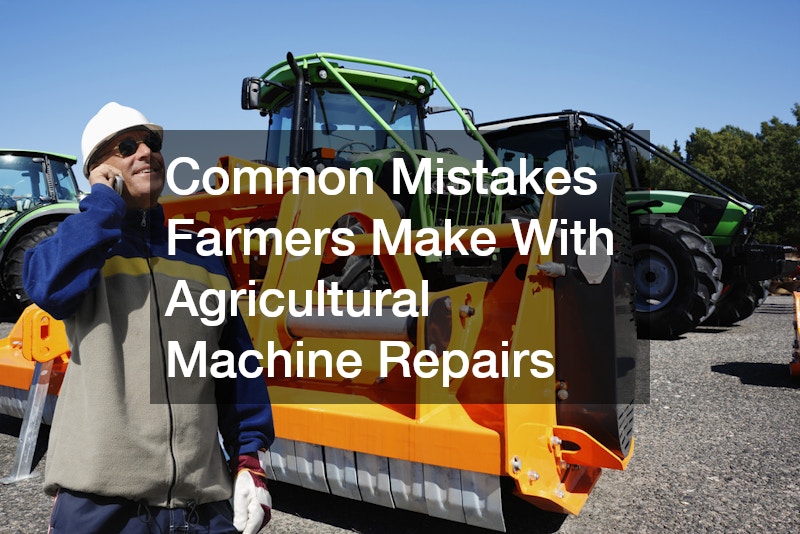
Understanding the complexities of agricultural machinery can be daunting for many farmers. Inevitably, machinery will require repairs, and knowing how to handle these situations effectively can save time and money. This article explores common mistakes and offers solutions to frequently encountered issues.
How Farmers Avoid Overlooking Routine Maintenance
Importance of Regular Maintenance Checks
Regular maintenance is vital to ensuring agricultural machinery operates at peak performance. Neglecting routine checks can lead to unexpected machinery breakdowns, which are often more costly and time-consuming to fix.
Farmers who prioritize maintenance can prevent minor issues from escalating into significant mechanical failures.
Consider that routine maintenance encompasses simple tasks, such as oil changes and filter replacements, which significantly impact machine longevity. A commitment to regular checks reduces the likelihood of major, disruptive failures during critical farming seasons. By performing scheduled maintenance, farmers improve operational efficiency and machine reliability.
Time spent on maintenance can seem like a burden when faced with pressing farm tasks. However, when viewed as an investment in equipment reliability, maintenance becomes a proactive strategy against downtime. Sustainable farming hinges on equipment dependability, making the effort worthwhile in the long run.
Creating a Maintenance Schedule
Establishing a maintenance schedule is a practical approach to preventing overlooked maintenance tasks. Such schedules should detail each piece of equipment’s specific needs based on manufacturer recommendations. Utilizing technology, such as calendar alerts, helps farmers adhere to these schedules consistently.
A maintenance schedule can benefit from a well-organized checklist detailing required tasks and timeframes. This systematizes activities, enabling farmers to monitor and complete necessary inspections with precision. Over time, the regularity of the schedule becomes a habit that significantly mitigates the risk of machine failures.
Consistency in maintenance scheduling also aids in proper resource allocation, ensuring both time and budget are used efficiently. It allows farmers to anticipate and prepare for maintenance needs, avoiding frantic, last-minute solutions. Consequently, this routine contributes to reducing the overall cost of ownership of agricultural machinery.
The Dangers of Using Improper Tools and Parts
Understanding Compatibility and Quality
Using the wrong tools or non-compatible parts can irreparably harm agricultural machinery. Adhering to manufacturer specifications is crucial to maintaining equipment integrity and performance. In many instances, improper tools exacerbate minor issues, complicating repair processes.
The quality of parts is equally important; low-quality replacements often lead to frequent failures, diminishing equipment functionality. Inferior parts not only void warranties but also jeopardize machine reliability and safety. Farmers should therefore emphasize acquiring high-quality, compatible components.
Cross-referencing part compatibility with manufacturer guidelines prevents installation mishaps and operational inefficiencies. Investing in the right tools and parts initially can save significant costs associated with long-term mechanical problems. Such measures are instrumental in sustaining optimal machine performance across seasons.
Where to Source the Right Equipment and Parts
Farmers should procure equipment and parts from reputable suppliers to ensure high-quality standards. Trusted vendors offer products with warranties, providing assurance for compatibility and durability. Establishing relationships with reliable suppliers facilitates access to the best components readily when needed.
Advantages of sourcing from reputable suppliers include access to expert advice and support, which are invaluable during the complex repair process. These providers often have detailed knowledge about machinery specifics, easing the selection of appropriate parts. Additionally, farmers are less likely to encounter counterfeit products, a risk with unauthorized dealers.
In an internet-driven marketplace, online research coupled with verified customer reviews can guide farmers in identifying trustworthy suppliers. Comparing multiple vendors ensures competitive pricing without compromising on quality. As a result, farmers can reformulate their supply chain strategies to capitalize on the benefits of high-quality parts.
Why Professional Training Is Essential for Machine Repairs
Benefits of Skilled Technicians
Engaging skilled technicians for repairs often leads to more precise troubleshooting and efficient solutions. Professional technicians possess an adept understanding of complex machinery, identifying underlying issues that might be overlooked by the untrained eye. This comprehensive expertise ensures lasting repairs rather than short-term fixes.
Skilled technicians bring specialized tools and techniques to the repair process, enhancing the quality and speed of service. Their advanced training allows them to execute repairs with greater accuracy, contributing to reduced downtime. This level of professionalism bolsters operational continuity and equipment longevity.
Moreover, experienced technicians keep abreast of the latest developments in machinery maintenance, offering informed advice to prevent future malfunctions. Partnering with such experts ensures adherence to industry best practices, fortifying overall farm productivity. Thus, leveraging professional help is a strategic investment towards sustainable farming operations.
Investing in Continuing Education
Continued education in machine repairs equips farmers and their employees with improved problem-solving skills and technological insights. Training programs often introduce new methodologies that enhance maintenance efficiency and effectiveness. Regularly updating technical knowledge keeps farmers prepared for evolving challenges and solutions.
Farmers who engage in ongoing training can self-conduct minor repairs and maintenance, reducing dependency on external technicians. This empowerment translates to significant cost savings and quicker turnaround times for equipment servicing. Moreover, possessing repair skills provides farmers with the confidence to handle mechanical issues in real-time.
Access to education and training fosters a willingness to adapt to advancements in tools and machinery improvements. Eventually, this adaptability fuels innovation within farms, enabling farmers to adopt cutting-edge technologies. Continuous learning ensures that farmers leverage every opportunity to enhance productivity and operational success.
Avoiding common mistakes in agricultural machine repairs requires awareness and proactive management. By prioritizing regular maintenance, using proper tools and parts, and investing in professional training, farmers can ensure their machinery operates smoothly and efficiently. Staying informed and prepared enables farmers to maximize machine life and maintain uninterrupted farming operations.



